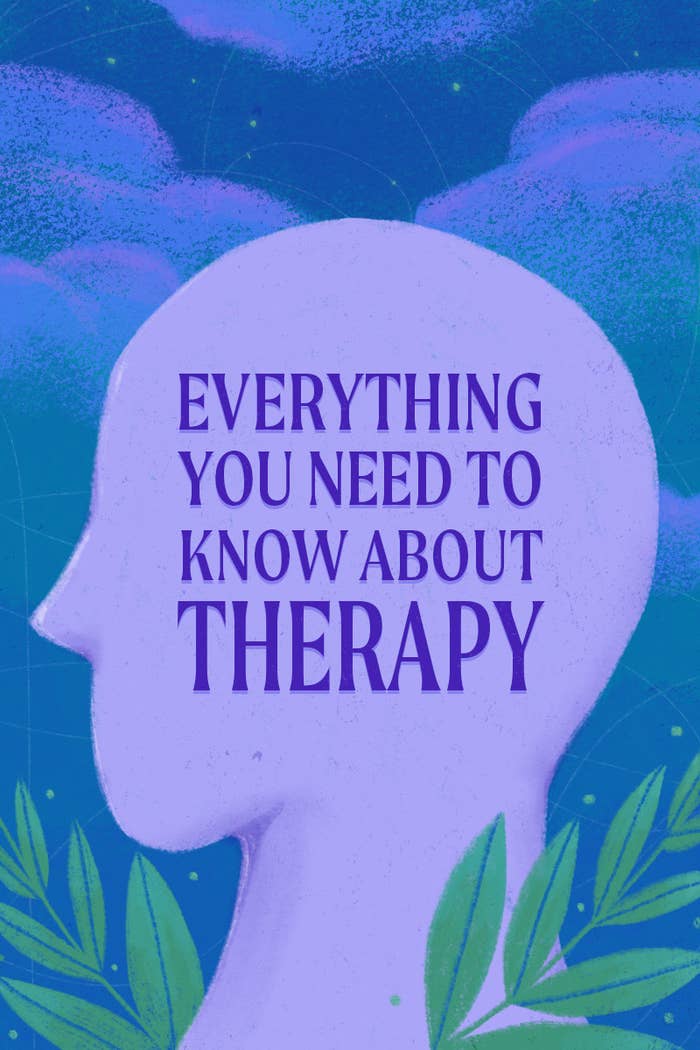
These days, therapy is becoming more popular (and thankfully less stigmatized) than ever. And while therapy can genuinely change your life for the better, it can still be a very confusing process to start.
I'm Farah and I'm an Associate Marriage and Family Therapist based in Los Angeles. Even as a trained professional, I embarrassingly struggled to find a therapist of my own when I first started out.

So I wanted to write this guide breaking down everything you need to know about therapy: what it is, how to pay for it, how to find the right therapist for you, and how to get the most out of the whole experience.
In this article, I'll also cover what I was trained and educated in — individual, couples, and family therapy — and give advice on what to do if you're a few weeks or months (or years) into therapy, and you find that you're not clicking with your therapist.
If there's anything I didn't cover, please leave any questions in the comments! I'll do my best to answer all of them in a future post.

1. What even *is* therapy anyway — and why is it important?
Since the word therapy can feel so nebulous and mystical, I am going to try to be super clear about what we’re discussing in this article: psychotherapy.
Psychotherapy, often shortened to just therapy, is a tool that can help individuals, families, and couples address various mental health or relationship issues that may come up at any stage of life.
Therapy can help someone make changes in their life, get unstuck, better understand themselves or their relationships, process trauma, work through specific issues, and more. Couples therapy can address things like working toward marriage, adding kink into a relationship, polyamory, infidelity, and more. In short? Therapy can be useful for most people for lots of reasons.
Throughout this article, I'll be using the terms psychotherapy, therapy, and talk therapy interchangeably.

2. How do people pay for therapy?
You might be wondering why financing therapy appears before finding a therapist on this list. I know it might seem backward to think about the money first but there is a practical reason for this. Figuring out how you can pay for therapy will be the first guidepost that will help you know where to look for a therapist.
For many of us, therapy is a longer-term investment. This means that if you find a resource that is more than you can’t afford, you may be stuck ending the relationship with that therapist earlier than you wanted to — simply because you cannot afford it for long enough. This is why paying attention to how you can pay for therapy and invest in yourself longer-term can be extremely useful.
Here are the most common ways that therapy is paid for:
1) HEALTH INSURANCE:
Health insurance usually covers mental health services with a co-pay based on the policy you are subscribed to. There are some things to be aware of before seeking out coverage through your health insurance. First, health insurance companies usually only pay for services that are deemed medically necessary. Each insurance company has outlined diagnoses from the Diagnostic Statistical Manual (DSM) that are considered medically necessary mental health issues. This means that you will likely be receiving a diagnosis from your therapist when they submit for the insurance company to pay for the services rendered. A diagnosis is usually documented at the end of the first session. Second, there will likely be a co-pay associated with your sessions. This means that sometime before or after each session, your therapist will likely collect that fee from you.
You can expect that your therapist will know what your co-pay is; however, it is always safest to call your insurance company and ask them what your co-pay is directly prior to engaging in services so that you can plan for the cost. And lastly, the information that is written in your chart is your personal health record, which means you can request to have access to it at any time. In the case of getting a formal diagnosis from your therapist, you can simply ask them what they are putting on your medical record or request the chart altogether.
2) SLIDING SCALE:
Sliding scale can look different based on the agency or practice that is offering the resource but typically a sliding scale therapist means they will work with you to set a price that works for you depending on your situation. This usually comes with a clearly delineated process to find a fee based on your income.
In private practice, therapists have more control over how they assign fees. Some therapists offer spots based on what you believe you can pay. Other therapists may share the lowest rate they're willing to slide down to. Just to be clear here, sliding scale and low-cost options are *not* "bargain therapy" and do not mean that you cannot ask for or look for a new therapist or that it will be less useful for you. All therapy services should meet ethical guidelines and your needs. If that isn’t happening, you can and probably should look for a new therapist.
3) COMMUNITY MENTAL HEALTH:
Community mental health sites are usually nonprofit organizations that offer low-cost, no-cost, or sliding scale therapy services based on whatever funding they receive. Many agencies are government-contracted sites. Government-contracted agencies usually have contracts with the local department of mental health services in your region. This means that any services that are rendered are usually paid for through the local funding such as the Medicaid program, which is a state-run insurance program for individuals who have low income or no income, or county funds.
Other nongovernment contracted agencies receive their funding through grants, donations, or even the sliding scale fees that they charge their clients. These organizations also provide low-cost, no-cost, or sliding scale services. The difference usually has more to do with what services they can offer and how much paperwork they will have to do than the quality of the therapy services rendered. Again, low-cost or no-cost therapy services are not bargain therapy in that you should be receiving high-quality services no matter how you finance it.
4) EMPLOYEE ASSISTANCE PROGRAMS (EAPs):
Some employers, especially bigger companies and organizations, have wellness benefits that might include access to a therapist on staff or a contract with off-site therapists. These arrangements usually have a session limit per year and will depend on your employer's benefit package. You can usually find out about these resources by inquiring with your Human Resources department. These resources can be really great to help people with short-term therapy for issues that may resolve over a few sessions or even just to help people get started in the process of engaging with therapy.
5) VICTIM'S ASSISTANCE PROGRAMS:
This is a program that is not as widely known; however, it is an incredible resource for any individual who is the victim of a crime or is in close proximity to a victim of a crime. Most states have programs that assist the victims of crimes with lots of financial aid. A victim of a crime is defined differently in each victim’s assistance program but it is usually pretty clear on the program's website and will often require documentation of a crime being committed against a person or a police report that demonstrates that. To find more information about these programs, you can do a quick online search with the keywords “Victim’s Assistance Program (your state here).” These programs offer financial support, referrals to resources, and support though legal processes.
6) SCHOOLS:
Most school systems provide access to therapy resources for their students. In K–12 programs, there is usually a school psychologist, therapist, or social worker available. To access these resources for yourself or a child, simply talk to a teacher or an administrator to get a referral for the services.
Universities often have counseling centers that provide all sorts of therapy resources, including group and individual therapy. These programs are usually limited in the number of sessions that you can have in a semester or calendar year. For that reason, they are often a wonderful resource to dip your toe in the pond of therapy and then get referrals for more permanent therapy services in the community should you want or need it.
7) SELF-PAY (OR OUT-OF-POCKET):
Self-pay is when a person is able to afford paying for therapy services out of their own pocket. If this is you, I always suggest looking at how much you can afford without stretching yourself too thin — and then looking for a therapist in that price range.
One thing to consider if you are a self-pay client is whether or not you have access to a flexible spending account, health savings account, or health reimbursement account. If this is something you’re considering or lucky enough to already have access to, talk to a financial advisor or your tax preparer to discuss this further and see how you can use pretax dollars for your therapy costs. After all, therapy should be part of your regular healthcare routine if you want or need it to be.

3. What are the first steps in looking for a therapist?
Now that you have an idea of how you can personally afford or access therapy, the next step is actually finding a therapist.
The biggest takeaway that I want you to have from this article is that you are allowed to shop around for a therapist that is the right fit for you — because just like you, your therapy experience is unique. Don’t be afraid to call a therapist and ask them some questions about their experience, how they work in the therapy room, and other things that might be important to you. Therapy is a deeply personal experience, so I really encourage you to trust your gut here. A sense of safety and comfort is crucial to being able to open up and work toward healing.
An important note here is that feeling comfortable to open up is very, very different from never feeling discomfort. Therapy is wildly uncomfortable for me for infinite reasons and it will probably be varying levels of uncomfortable for many of you, too. That is okay! That doesn’t mean your therapist is a bad therapist and it doesn’t mean you can’t do this. It is genuinely difficult to examine yourself and rearrange the way you exist and think. Think of it like lifting weights or any other skill you have to incrementally build. It often isn’t comfortable — especially at first — but over time and with repetition, it can help you be at your best. Therapy is just like that: When you push through that discomfort and lift the heavy emotional weights, you’ll reap the benefits.
Here are several tools and resources to help kick off your search:
1) Google:
This one is obvious, but sometimes a simple Google search for mental health resources in your area can provide you a list of counseling centers and mental health providers. Plus, haven’t we all googled "Restaurants Near Me" at some point or another? Why should therapy be any different?
Can be used for: Self-Pay, Health Insurance, finding Victim’s Assistance Program Providers, and Sliding Scale Therapy
2) Psychology Today:
This is a directory where many therapists have a profile listing out important information about their practice such as their fee, contact information, specializations, or populations they serve.
You can use the filters to narrow down what things are important to you in a therapist: gender, specialty, fee, accepted insurance, theoretical orientation, etc.
Can be used for: Self-Pay, Health Insurance, finding Victim’s Assistance Program Providers, and Sliding Scale
This website has a $59 fee to join but it is a lifetime membership. After joining, you can access a whole host of individual therapists who offer individual, family, and couples counseling between $30 and $80 per session.
Can be used for: Sliding Scale and/or Self-Pay
4) Going through your health insurance:
Insurance companies (including Medicaid providers) have what is called a provider panel. Your insurance provider has access to a list of all of the providers in your area that take your insurance. They can often even tailor a list of providers for you based on geographical location or other specifications, such as gender. All that’s left to do at this point is call and schedule some consultation appointments!
Can be used for: Finding a therapist who accepts your health insurance.
5) Word of mouth:
Sometimes the best thing you can do for yourself is get connected with the friend of a friend. Word of mouth is how most of my colleagues in private practice get referrals for clients and how many of the clients whom I have worked with in sliding scale clinics hear about the centers that provide low-cost services. In short? Never underestimate word of mouth!
Can be used for: Self-Pay, Health Insurance, Victim’s Assistance Programs, and Sliding Scale
Important notes about finding a therapist:
If you are choosing to start your journey with a therapist through school, work, or some other short-term agreement, don’t worry about it being short-term. That is an incredible place to start and the provider will clearly spell out what they are able to provide you and for how long from the very beginning. At the end of your time together, you can always ask for referrals and work with that provider to connect you to other community resources. Therapists who work in these settings are often well connected in the community because they understand their limitations.
If you are unable to afford low-cost therapy services or you need assistance finding services that involve housing or other basic necessities in addition to finding a therapist, you can call 211 or go to 211.org. 211 is a hotline that will help get you referrals to various local agencies that can help you get the services that you need. The referrals provided can be everything from temporary housing like shelters to case management, substance use treatment, mental health services, medical services, and more.

4. Should I try to find a therapist who is exactly like me?
Representation in therapy matters for the same reasons it matters in other fields. And there are some added benefits to being able to relate to the person who is helping you navigate healing. Does this mean that you have to find a therapist who is exactly like you? The short answer is no. The long answer is that finding a therapist whom you feel comfortable with is more likely to help you foster a space where you can feel brave enough to open up, thereby fostering the healing process.
Theoretically speaking, therapists are trained to be open-minded in their work and be able to work with anyone. That does not mean that you should have to endure working with someone who triggers traumatic feelings for you or that you feel like you are having to educate about your identity or cultural upbringing over and over again. So my advice about who you choose your therapist to be is that it should be someone who helps you create a safe space, one in which you can genuinely open yourself up and not feel unsafe or unsupported doing so.
Here are a few resources:
3) Asian Mental Health Collective (APISAA)
5) National Queer and Trans Therapists of Color Network
You can also find a list of mental health resources for BIPOC here and a roundup of online therapy options here.
5. Once I've found a therapist, how can I get the most out of my sessions with them?
This is a question that I get about therapy a lot. I like to give therapy newcomers a breakdown of the kind of work you do when you go to therapy each time: the content vs. the process.
• Content is exactly what it sounds like. It's literally what you bring into session to talk about. That can be something like a feeling, an issue you’re having at work, or something you are stressed about. It’s the stuff that you are hoping to change, fix, or understand better. Some people plan for what they might bring into therapy sessions, while others simply come in ready to talk about the things that feel most present for them. There is no right way of engaging in the content part of therapy; however, sometimes journaling or taking notes throughout the week can help you figure out what is most pressing for you or what tends to show up again and again.
• Process work is more nebulous but it points to the process of engaging in therapy and building a relationship with your therapist. Think of it this way: The way you engage with your individual therapist can really help you understand how you interact with others in the outside world. And, crucially, you're able to do this in the safe, supported space of a therapy session.
Some examples of process work would be: how you feel about your therapist asking a line of questions relating to your content, if your therapist says something that makes you feel a certain way and you decide to either bring it to them for discussion or not, and even how you feel you relate to your therapist as a person. The very act of showing up to build a new relationship with someone can be very therapeutic.
The moral of the story? As long as you are showing up and trying to engage with a level of vulnerability that feels good and safe for you, you are doing therapy right. So if you’re stuck on how to start engaging with therapy to make it useful, there is no better way than to just start going and adjust as you see fit!

6. What should I know about couples therapy?
Couples therapy is exactly what it sounds like: therapy meant for two people wanting to work through an issue at hand. Maybe the couple wants to get to the root of stress and strain within their relationship or learn how to communicate with each other more effectively or work through the aftermath of infidelity. Whatever it may be, talking to someone can be helpful to work out how to approach the issues at hand.
One of the major differences with couples therapy is the idea that neither individual is the client. Rather, the relationship between the two individuals is the central focus. This means that a couples therapist will not likely take sides or blame one person because they are trying to focus on the real client: the relationship.
Couples counseling is often more costly than individual therapy, though many of the payment options discussed earlier can apply.
One caveat here: If there is active domestic violence occurring in a romantic partnership, receiving individual therapy instead of couples therapy may be a better option. In these situations, there is a valid concern that being in therapy together could inadvertently perpetuate the violent dynamic. If you are in need of resources for domestic violence specifically, find them at the National Domestic Violence Hotline's website here.
7. What about family therapy?
Family therapy can be useful to help families create an awareness around how each person impacts the entire unit. Often, families will have one person who is struggling and they will send them off to individual therapy without thinking about how everyone in the family impacts everyone else.
Just like couples and individual therapy, family therapy has its own set of theoretical orientations and approaches. Many approaches to family therapy look at the dynamics between the individuals who create the family system. Family therapy often removes the stress and pressure of having one person being held responsible for the issues of an entire family and can help families navigate difficulties with greater unity and ease.
Family therapy, just like couples therapy, can often be more expensive than individual therapy. However, many of the financing options discussed previously also apply here.

8. I keep hearing the word "trauma." What should I know about it?
Trauma is a reaction to an event that is distressing. Some examples of distressing events that can cause a traumatic reaction might include: experiencing a physical or sexual assault, experiencing racism, experiencing bullying, losing a significant relationship, experiencing an encounter with law enforcement, witnessing violence or an act of terrorism, surviving war, separating from one's parents at a young age, going through divorce, grieving the death of a family member or loved one, and more. The list of things that can cause a trauma response is extensive and diverse. And you may have experienced something on that list that did *not* cause you to have a trauma response. That is because trauma is based on the individual's reaction to something.
This is a very simplified explanation of trauma and there are other types of trauma that exist, including collective trauma, intergenerational trauma, and racial trauma. And it is very important to note that the same way not everyone experiences trauma after a distressing event, not everyone who does experience trauma develops post-traumatic stress disorder.
So, how is trauma treated in individuals who experience it? It varies greatly — as there is no one-size-fits-all solution for helping someone heal their trauma. There are, however, some promising tools and models that can be helpful in allowing people to lower their levels of distress around difficult experiences. Two examples are EMDR and Somatic Experiencing.
EMDR, or Eye Movement Desensitization and Reprocessing, is a form of therapy that helps clients reprocess feelings around distressing and difficult memories while using bilateral stimulation. Learn more about EMDR here.
Somatic Experiencing, like EMDR, is a framework for clinicians to help clients move through their challenges with the fight, flight, or freeze responses around distressing events and memories. Learn more about Somatic Experiencing here.
For any of these tools and models, it's important to note that a therapist should absolutely not engage in work they are not adequately trained to do. Training and certification are different and a therapist has an ethical responsibility to not do things they are simply not adequately trained in. You can always ask your therapist what training they have to be doing the specialty work they are engaging in. After all, advocating for yourself is part of the process.
9. I'm a few weeks/months/years into therapy and I'm not really clicking with my therapist. When do I know it's time to look for a new one?
Therapy can and should feel like a safe space for exploration but I can’t count how many times I’ve heard stories of clients just enduring difficult feelings around their therapist because they are scared to bring them up to them directly.
If you feel like your therapist has said something that hurt you and/or you can’t stop thinking about it, I encourage you to bring it up. A good therapist will take a moment like that — what we call a "rupture in the relationship" — and work to repair it. This works to heal you on several levels and it fundamentally shows you that repair is both possible and something you are deserving of.
Now, don’t get me wrong. This shit is hard! The idea of bringing your most vulnerable self and asking for someone to repair damage caused by their actions or words is extremely difficult. But I can say from personal experience that it is also incredibly liberating.
Now, not every therapist will handle these ruptures the same, or even well. And certainly, there are professional people in the field of therapy that maybe shouldn’t be there. However, you still deserve to speak up. I would bet that most therapists would repair the rupture, maybe not immediately, but they would work to do so even if it takes time. And frankly, if you’ve brought something up that is deeply personal and vulnerable such as a rupture and you don’t feel respected, cared for, or listened to, I think it is perfectly normal — and frankly good — to let them know that you will be seeking out alternatives. You can even ask them for a referral. It’s all part of the process.
To sum up: You should get out there and get yourself a therapist!
In all seriousness, therapy is so much more than just talking about your problems and it can be a real, tangible lifeline for someone who feels stuck, is navigating difficulties in a relationship or in their life, or is questioning or working to better understand their identity. My own therapist seems to think this post is a solid starting point (thanks, Kathie!) and I hope this list was helpful to you! Best of luck in tackling your own. ✨
